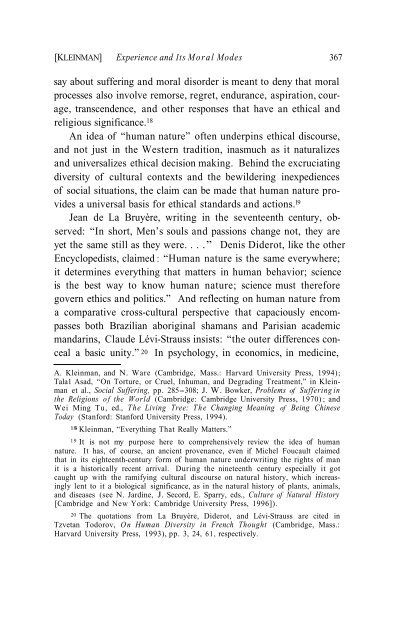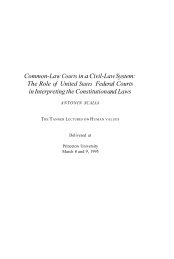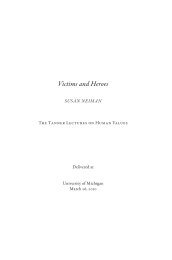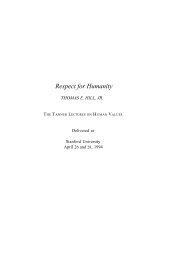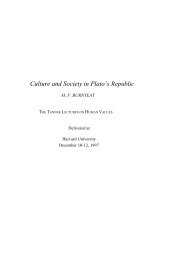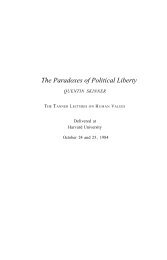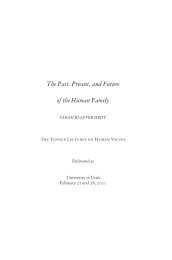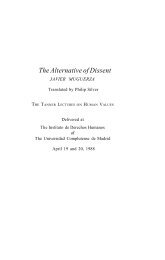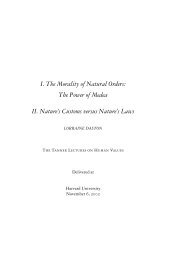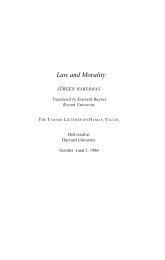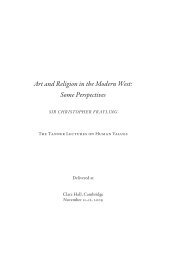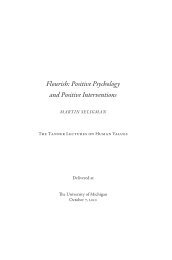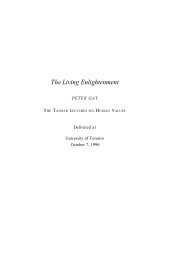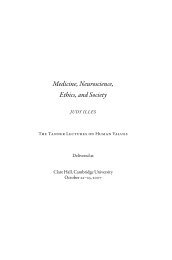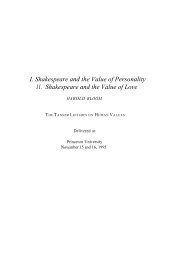Kleinman, Arthur - The Tanner Lectures on Human Values
Kleinman, Arthur - The Tanner Lectures on Human Values
Kleinman, Arthur - The Tanner Lectures on Human Values
You also want an ePaper? Increase the reach of your titles
YUMPU automatically turns print PDFs into web optimized ePapers that Google loves.
[KLEINMAN] Experience and Its Moral Modes 367say about suffering and moral disorder is meant to deny that moralprocesses also involve remorse, regret, endurance, aspirati<strong>on</strong>, courage,transcendence, and other resp<strong>on</strong>ses that have an ethical andreligious significance. 18An idea of “human nature” often underpins ethical discourse,and not just in the Western traditi<strong>on</strong>, inasmuch as it naturalizesand universalizes ethical decisi<strong>on</strong> making. Behind the excruciatingdiversity of cultural c<strong>on</strong>texts and the bewildering inexpediencesof social situati<strong>on</strong>s, the claim can be made that human nature providesa universal basis for ethical standards and acti<strong>on</strong>s. l9Jean de La Bruyère, writing in the seventeenth century, observed:“In short, Men’s souls and passi<strong>on</strong>s change not, they areyet the same still as they were. . . .” Denis Diderot, like the otherEncyclopedists, claimed : “<strong>Human</strong> nature is the same everywhere;it determines everything that matters in human behavior; scienceis the best way to know human nature; science must thereforegovern ethics and politics.” And reflecting <strong>on</strong> human nature froma comparative cross-cultural perspective that capaciously encompassesboth Brazilian aboriginal shamans and Parisian academicmandarins, Claude Lévi-Strauss insists: “the outer differences c<strong>on</strong>ceala basic unity.” 20 In psychology, in ec<strong>on</strong>omics, in medicine,A. <str<strong>on</strong>g>Kleinman</str<strong>on</strong>g>, and N. Ware (Cambridge, Mass.: Harvard University Press, 1994) ;Tala1 Asad, “On Torture, or Cruel, Inhuman, and Degrading Treatment,” in <str<strong>on</strong>g>Kleinman</str<strong>on</strong>g>et al., Social Suffering, pp. 285-308; J. W. Bowker, Problems of Suffering inthe Religi<strong>on</strong>s of the World (Cambridge: Cambridge University Press, 1970) ; andWei Ming Tu, ed., <str<strong>on</strong>g>The</str<strong>on</strong>g> Living Tree: <str<strong>on</strong>g>The</str<strong>on</strong>g> Changing Meaning of Being ChineseToday (Stanford: Stanford University Press, 1994).<str<strong>on</strong>g>Kleinman</str<strong>on</strong>g>, “Everything That Really Matters.”19 It is not my purpose here to comprehensively review the idea of humannature. It has, of course, an ancient provenance, even if Michel Foucault claimedthat in its eighteenth-century form of human nature underwriting the rights of manit is a historically recent arrival. During the nineteenth century especially it gotcaught up with the ramifying cultural discourse <strong>on</strong> natural history, which increasinglylent to it a biological significance, as in the natural history of plants, animals,and diseases (see N. Jardine, J. Secord, E. Sparry, eds., Culture of Natural History[Cambridge and New York: Cambridge University Press, 1996]).20 <str<strong>on</strong>g>The</str<strong>on</strong>g> quotati<strong>on</strong>s from La Bruyère, Diderot, and Lévi-Strauss are cited inTzvetan Todorov, On <strong>Human</strong> Diversity in French Thought (Cambridge, Mass.:Harvard University Press, 1993), pp. 3, 24, 61, respectively.


